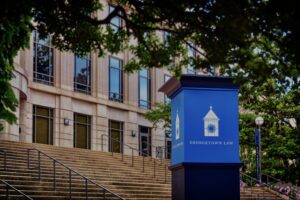With its endowment hovering around a billion dollars, Georgetown University lags far behind its peer schools. Bill O’Leary might be the man to augment the University’s paltry sum.
James Langley, who was hired two years ago as the Vice President for the Office of Advancement, wanted a team that could better articulate Georgetown’s mission for the school’s new capital campaign, which will begin in the next two years. Last May he added O’Leary to his lineup, a move indicative of the changes Advancement plans to implement for this new campaign.

“We had never had someone who had Bill’s expertise in marketing,” Langley explained. “What I thought we needed was someone who better understood the opinions and attitudes of the people.”
Georgetown’s endowment is not millions but billions of dollars short compared to other schools of Georgetown’s stature. Harvard and Yale each have endowments of $34.9 billion and $17.95 billion respectively, according to a U.S. News and World Report study. The University jumped on the fundraising bandwagon a bit late, not starting serious long-term fundraising until the ‘70s while other schools had begun much earlier, mostly during the post-World War II era, according to Langley. “Our endowment is equivalent to what you would find at a small liberal arts college,” O’Leary said. Even Grinnell College, with a student body of about 1200, has cracked a billion with an endowment of $1.471 billion.
According to both O’Leary and Langley, the University is on an upward trend. It’s last capital campaign ran from 1995 to 2003, and raised a billion dollars. The new campaign should raise at least $1.5 billion in about seven years, Langley said.
O’Leary, who received an MBA from Georgetown in ‘98, said that he is focused on alumni in a way similar to how a small company would approach consumer marketing.
University President John DeGioia has a tremendous role in marketing Georgetown to potential donors, he said. Langley compared the capital campaign to a political one. “Georgetown is the cause, DeGoia is the candidate, and we have seven years to advance our cause,” Langley said. “He is the articulator of the purpose of Georgetown, and the setter of the agenda of where the University is going and what it wants to achieve.”
He also said that DeGoia has given significant support to the building a Board of Trustees which will be “extraordinary” in helping the University secure more successful fundraising.
Langley said that they plan to “open up new markets on behalf of Georgetown,” from influential Washingtonians to non-alumni philanthropists internationally. “For the first time, we have a full-time representative on the ground in Europe appealing to alumni parents and others who we think might have an interest in Georgetown.” Early analysis from Georgetown’s rep in Europe is encouraging, he said.
O’Leary said they’ve found that 87 percent of alumni say that Georgetown had a “profound impact” on their lives, even though only 31 percent of alumni actually give to the University, according to the U.S. News and World Report.
There is no quick fix, however—O’Leary said that Advancement looks to a 50-year horizon when it comes to Georgetown’s endowment. Both Langley and O’Leary are positive, though. “Only Georgetown is in there competing with the heavyweights without the same level of resources,” Langley said. “That impresses donors.”




